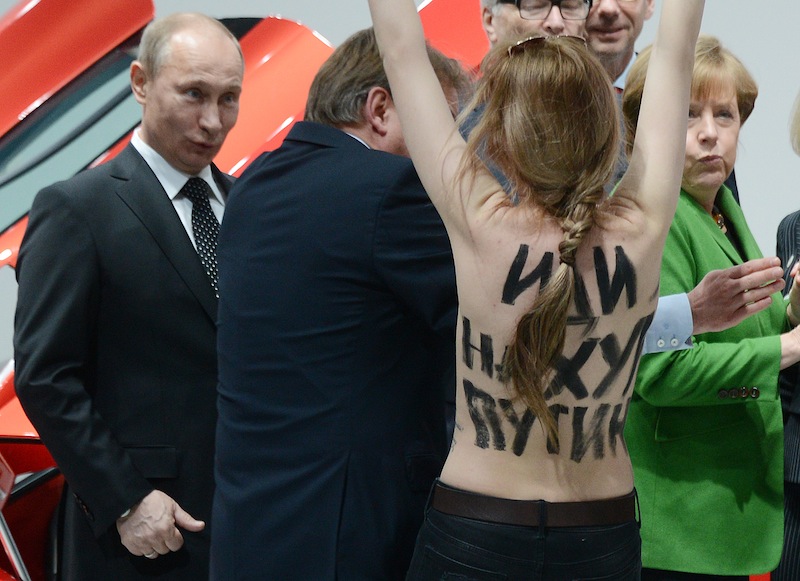AMSTERDAM (AP) — After getting an earful from Chancellor Angela Merkel on the importance of civic society, Russian President Vladimir Putin was heading Monday to Amsterdam, where rights activists were ready to blast Russian gay rights policies.
Rainbow flags were flying at half-staff around the city and rights groups planned actions and a major protest.
In January, Russian lawmakers gave tentative approval to a bill that makes public events and dissemination of information about the lesbian, gay, bisexual and transgender community to minors punishable by fines of up to $16,000. It still requires final approval by parliament and would have to be signed by Putin to become law.
Putin’s visit aims to showcase growing economic ties between the two countries. With $83 billion in bilateral trade last year, the Netherlands outpaced Germany to become Russia’s No. 1 trading partner in Europe and its second biggest partner in the world after China.
Amsterdam deputy mayor Andrée van Es said the city appreciates the importance of trade and was glad to host Putin, but it was also supporting the protests with rainbow flag outside city hall.
“We see Russia as an important trading partner, but Amsterdam has an identity of what I call hyper-diversity… and we very much want to be able to express that, even to our important trading partners,” she said in an interview Monday.
Accumulated Dutch investments in Russia stood at $62 billion as of the end of last year. Dutch firms have been among a selected few foreign companies granted access to Russia’s offshore oil and gas deposits, and Shell and Gazprom are widely expected to sign a deal later Monday on developing natural gas fields in Siberia.
In 2001, the Netherlands became the first country in the world to legalize gay marriage.
Russia decriminalized homosexuality in 1993, but homophobia remains strong in the country and authorities routinely ban gay pride parades. The new bill includes a ban on holding public events that promote gay rights.
Authors of the bill, which is backed by the Kremlin’s dominant United Russia party, say minors need to be protected from “homosexual propaganda” because they are unable to critically assess the information. Its critics say the legislation would contradict Russia’s international obligations and is part of the Kremlin crackdown on minority groups and critics.
“A lot of people are worried about human rights in Russia in general, but focus is very much on gay rights because of that bill,” Van Es said.
Outside the Hermitage Museum in Amsterdam, where Putin is to meet the Netherlands’ Queen Beatrix and Prime Minister Mark Rutte later in the day, activists from Amnesty International hung signs satirizing Russian policy.
“No gay rights propaganda beyond this point,” read one poster. “Do not frighten President Putin: keep this area human rights free,” read another.
The activists also used fake police tape to block off access to the museum, with the message “critical journalists not allowed.”
The Hermitage, a satellite of Russia’s Hermitage Museum in St. Petersburg, is located on the Amstel River — just a stone’s throw from Amsterdam City Hall. It was not clear whether authorities would allow the signs directly in front of the museum to remain during Putin’s visit; others are hanging from residential windows across the river.
Putin’s trip was timed to kick off a year of cultural exchanges. He and Queen Beatrix are to visit an exhibition dedicated to Peter the Great, the Russian czar who founded St. Petersburg and sought to open up closer ties with Europe.
Putin emphasized those historic ties in a letter published in De Telegraaf newspaper.
“The people of Russia are well aware that the Dutch were the ones who taught seamanship to Peter the Great; 400 years ago Holland was a leading maritime and trade power, and its natives left a major imprint in the world’s history, including Russia,” he wrote.
Earlier Monday, Putin met with Merkel at an industry fair in Hannover. She confronted him on Russia’s crackdown on non-governmental organizations, but Putin brushed the issue aside by repeating that his government needs to know who is funding the groups.
“A lively civil society can only develop if individual organizations can work without fear and worry,” Merkel said at a news conference with Putin.
Leading Russian NGOs have pledged to boycott a bill that requires them to register as “foreign agents.” Putin has responded by ordering wide-ranging checks of up to 2,000 NGOs across the country.
“We aren’t trying to put anyone under control, but we want to know how much money, through what channels and for what purpose, is being sent,” Putin said. “Russia has passed a law on that and everyone will obey it.”
He said NGOs in Russia had received nearly $1 billion from abroad.
“Maybe this money, which is quite a bit — a billion — could have been sent to help Cyprus and then it wouldn’t have been necessary to fleece unfortunate depositors,” Putin commented, referring to the European Union’s complicated bailout for the tiny island nation in which Russian depositors are expected to lose significant funds.
As the two leaders toured the fair, activists from Ukraine’s Femen group bared their torsos and shouted “Putin dictator!” before being detained.
A smiling Putin shrugged off the protest.
“I liked it,” he said. “You should be grateful to the girls, they are helping you make the fair more popular.”
___
Geir Moulson contributed to this report from Berlin.
Copyright 2013 The Associated Press.






